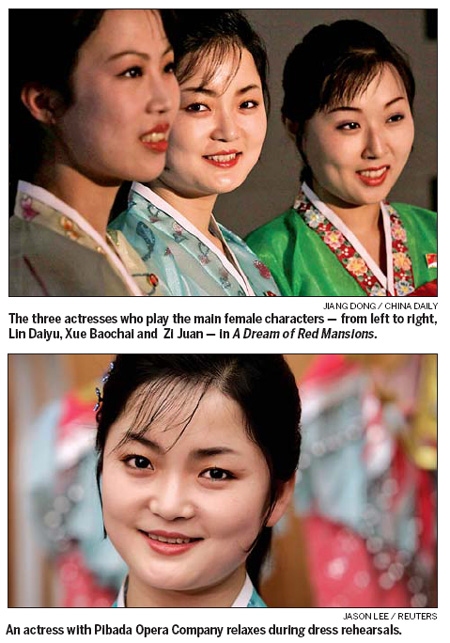Society
Under the veil of mystery of a Korean performance
By Chen Jie and Duan Yan (China Daily)
Updated: 2010-05-07 07:51
 |
Large Medium Small |
Since the first manuscripts of A Dream of Red Mansions (Hong Lou Meng, also known as A Dream of the Red Chamber) were released by author Cao Xueqin in the 18th century, the novel has been a bestseller not only in China but also around the globe.
Centered on a love triangle, the tale of Jia Baoyu and his lover, Lin Daiyu, and would-be bride, Xue Baochai, is well known by most Chinese, yet there is still a genuine fascination in the country about the DPRK performance.
"Just imagine the scene in which Lin Daiyu buries her fallen flowers. What would it sound like if she was singing in Korean?" said an enthusiastic Yang Hanlin, general secretary of the Hunan Foundation For Culture and Arts. His department is responsible for organizing the performance in Changsha, the provincial capital, on May 21 and 22.
He said several of his colleagues traveled to Beijing to be at the premiere on Thursday.
The DPRK version of the show dates back to 1961, when former DPRK leader Kim Il-sung watched a traditional Yueju Opera company perform it in Beijing. He was so impressed that, upon his return home, he translated the script and rewrote it into a Korean folk tale.

A Dream of Red Mansions went on to be a roaring success in the country and was even praised by Deng Xiaoping, the late Chinese leader, who went to Pyongyang, the DPRK capital, to watch the translated version in the 1980s.
Today, cultural experts say the show stands as a symbol of enduring friendship between the two nations.
Kim Jong-il ordered the show be revived last year and the new production - which he is credited with directing - premiered last September, coinciding with Premier Wen Jiabao's visit to Pyongyang.
"I watched the play directed by Kim Il-sung when I was in college," said Cae Myong-sok, 59, who is in charge of the day-to-day running of the Korean show. "The old version was state-of-the-art at that time and people enjoyed it very much.
"In this new century, we have applied the latest theater techniques and costumes to revive the show in a trendy way," he said, adding that he is honored to direct the new production under the supervision of Kim Jong-il.
Kim Yong-rok, Pibada's production director, told China Daily: "We've performed more than 50 shows to some 100,000 people, to those who watched opera in the 1960s and young people who are not familiar with the story."
Celebrated heroes
The two-hour, 30-minute debut show on Thursday night combined Korean folk melodies, traditional Korean instruments and a Western symphonic orchestra.
Kim Il-hwang filled the leading role perfectly, his fine voice evoking the spirit of Xu Yulan, the master Chinese singer who played Jia in the Yueju Opera. The setting was realistic, with real waterfalls, and the dancing delicate. The costumes and makeup were almost identical to the 1987 version broadcast on Chinese television.
"I watched the TV production in 1987," said star Li Jong-ran. "It's challenging to perform the play in China, especially the role of Lin Daiyu, because it's such a popular story and everybody has his own understanding of the character."
Like Li, most of the leading actors and actresses are in their 20s and graduated from the Pyongyang Kim Won Gyun Conservatory, the top musical education institute in the DPRK. "I began to learn to sing when I was 6," she said. "The government would select young talent for the arts schools and provide free education. In college, I received training from more than 10 teachers in singing and acting. After graduation, I joined Pibada Opera Company."
Li and her cast members are superstars in the DPRK, according to Kim Yong-rok. "Thanks to their natural talent in singing and performing, as well as the long-term intense training they get, they give impressive performances on stage," he said.
Lu Chao, a researcher with the Liaoning Academy of Social Sciences explained: "Performers are very well respected in the DPRK, not just as celebrities like here in China, but as national heroes."
Many of those who have witnessed the Korean version of the tragic story say they were surprised by the performers' ability to fully understand what is a classic Chinese tale.
"I saw them rehearse and it's already very professional," said dancer Wang Yabin, who was one of four Chinese performers and theater experts invited to Pyongyang last November to advise on the stage setting, costume design and choreography. "My job was just to offer them some suggestions on adding a few more Chinese elements in the dance," she added.
A Dream of Red Mansions is not the only one of the four Chinese classics that has traveled to the DPRK. The others, Romance of the Three Kingdoms (San Guo Yan Yi), Outlaws of the Marsh (Shui Hu Zhuan) and Journey to the West (Xi You Ji), are also favorites there, said Lu.
"Cultural exchanges between the two have been very frequent. When I was in the DPRK in the 1990s, Chinese TV shows like Ke Wang and Romance of the Three Kingdoms were popular in both countries," he said. "We also received some classic DPRK productions in the 1970s and 80s, such as The Flower Girl, a well-known movie, and Sea of Blood."
Although famous a few decades ago, The Flower Girl and the revolutionary opera Sea of Blood (Pibada in Korean, the play the opera company is named after) are not well known to young people in China today.
"I think we need to update the cultural exchanges we have with the DPRK," added Lu Chao. "We shouldn't just export the classics. We need to exchange modern culture that reflects the times we live in."







